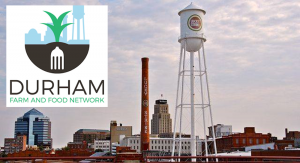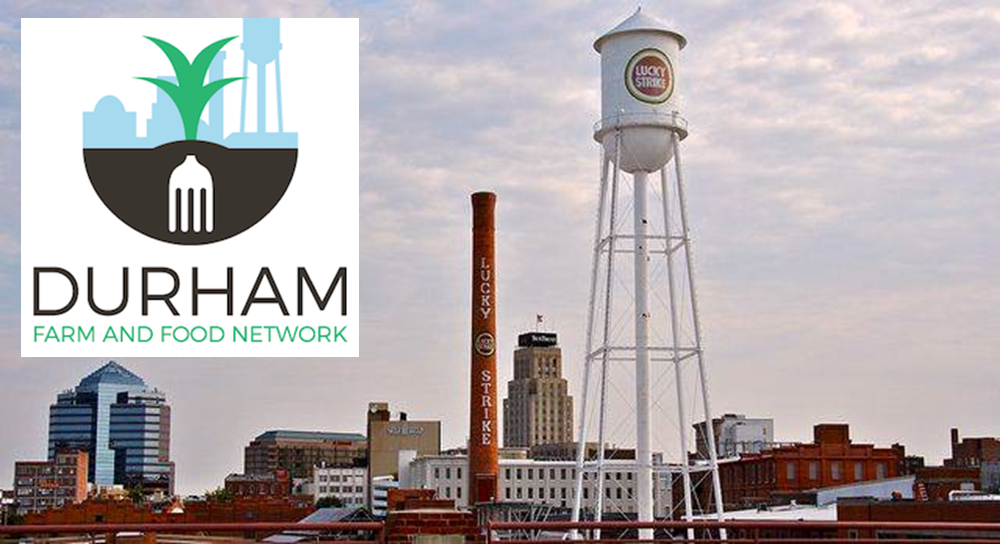
This article was written for a pre-election day audience, following the Durham Food and Farm Network’s Candidates’ Forum. Charles Meeker has since lost his race.
Durham is the foodiest town in the south, yet nearly 1 in 5 of the county’s residents don’t know when their next meal will be. With the presidential election upon us, it’s easy to get lost in the weeds, but we need to hold our local elected officials accountable to ensure that food in Durham is accessible, healthy, and safe for all.
On October 26th, I volunteered with several other Duke students at a public forum hosted by the Durham Farm and Food Network (DFFN) for political candidates running for local and state positions. Nine candidates discussed their ideas and ongoing efforts relating to food. I was blown away by how well-versed these politicians were about food issues, and I was inspired by their passion for growing a better food community. Here are a few highlights from the evening:
1. Local chefs care about food justice
We heard from the people behind the event’s catering: Ricky Moore of the Saltbox Seafood Joint and Andrea Reusing of The Durham Hotel (who casually cooked alongside White House chef Sam Kass recently to benefit NC’s Center for Environmental Farming Systems). Moore summed up where we need to go with food access: “the more we support our local crabbers and fishermen, the more the cost drops.” Next, Reusing gave a rousing call to action to fix a food system that “relies on inequality to run.”
2. Candidates care, but we need to put in more resources
Excitingly, the candidates understand that we need to build on our existing efforts to protect the people who make our food, encourage the production of healthier foods, and make food accessible for those who need it most.
Ellen Reckhow (Democratic candidate seeking reelection to the Durham County Board of Commissioners) discussed how matching grants from our local government have helped finance possible community gardens around Durham, and the Durham Farmers’ Market pavilion that gives the market a beautiful permanent home. Community gardens are a great educational space, especially for teaching kids about making their own food and eating healthily. (As an aside, if you’ve never picked fresh herbs from the garden near the Durham Farmers’ Market, you’re missing out.)
To help increase food access, the Department of Public Health initiated a Double Bucks program, where recipients of SNAP (Supplemental Nutrition Assistance Program, formerly known as food stamps) can get $2 of produce when they spend $1 at farmers’ markets in Durham. Programs like this help make farmers markets available not only to middle and upper class shoppers, but also to the underprivileged people who suffer most from low food access.
Danielle Adams (Democratic candidate seeking reelection as Durham County Soil and Water Board Supervisor) described how the Durham Soil and Water Board has attempted to heal the racism in agriculture perpetuated by the US government by providing more generous cost-sharing for farmers of color and women farmers to support these groups who are underrepresented in agriculture

But more is needed. The candidates discussed their hope to create a dedicated county-level Food Commission that would provide technical assistance to the Durham Farm and Food Network and other community food organizations in their efforts to promote healthy food production, access, and education. This is exactly what we need – people who will connect the dots between the nonprofits, businesses, healthcare, and government actors who are working on food systems projects.
3. We must stop human rights abuses in the food system
Farmworkers and food service workers face some of the worst labor injustices in the country, yet labor issues in food are often ignored. These horror stories, a daily reality, are well-documented in a recent Oxfam report about how the chicken industry treats its workers in North Carolina – with some workers having to wear diapers in factory assembly lines. Seven of the ten lowest-paid occupations in the US are in the restaurant industry, and one-fourth of food service workers live in food insecure households. (If reading reports isn’t your thing, see this excellent John Oliver segment on contract farmers in the chicken industry.)
Additionally, North Carolina is one of a handful of states where “ag-gag” laws restrict the ability of workers, including agricultural workers, to document abuses they face on the job. These laws allow employers to sue employees for who gather such information, regardless of what the employee does with the information. This gives employers the dangerous ability to silence whistleblowers who might otherwise report abuses against people, animals, or the environment.
DFFN broached these labor issues by asking candidates whether they were committed to providing a living wage for workers in North Carolina, where the minimum wage is currently $7.25 per hour. Huge cheers erupted when we heard support for the Fight for $15 from Mike Woodard (Democratic candidate for NC Senate, District 22), Floyd McKissick (Democratic candidate for NC Senate, District 20), Danielle Adams, and Charles Meeker (Democrat candidate for NC Commissioner of Labor).
One of the most contentious races on Nov. 8 – that you should most definitely care about – will be between incumbent Republican friendly-face-in-the-elevator Cherie Berry and progressive Democratic challenger Charles Meeker. Meeker has promised to be tougher on businesses who mistreat their workers and to fight for a $15 minimum wage. This is especially important for farmworkers in North Carolina, where despite agriculture being the largest sector in our state’s economy, farmwork is among the lowest-paid and highest-risk jobs. Fighting for farmworker rights is also a step towards fighting the injustices committed against immigrants, since half of the 2 to 3 million farmworkers in the US are undocumented immigrants. Raising the minimum wage would also raise up the workers at Duke who provide our food. While the university has committed to a $13 minimum wage, the administration has not fully met the demand for a $15 minimum wage from Duke Students and Workers in Solidarity. If we elect officials who will make the Fight for $15 a centerpiece of their policymaking, this will put more pressure on Duke to provide a living wage for its employees.
4. Will Durham put its money where its mouth is?
Speaking of the $15 minimum wage, Wendy Jacobs (Democratic candidate seeking reelection to the Durham County Board of Commissioners) reported that the Board of Commissioners passed a resolution to implement a $15 dollar minimum wage for all county jobs. Jacobs pointed out that HB2 unfortunately prohibits this type of policy from being extended to private sector jobs in the county.
Jacobs talked about how government can lead by example by buying local. Heidi Carter (Democratic candidate for the Durham County Board of Commissioners) suggested that we should set goals for how Durham County procures food, such as a commitment to 20 percent local. Such a commitment could drive schools, prisons, senior centers, and other government-funded agencies to essentially bulk-buy from sustainable and local farms and producers. A single person who says they’re going vegetarian isn’t going to dismantle factory farming, but imagine what would happen if for just one day at Duke, we didn’t spent any food points on meat.
There’s a precedent for this – the North Carolina 10% Campaign encourages businesses, schools, and individuals to spend at least 10% of their food dollars on local products. The Real Food Challenge is a recent manifestation of this idea, which calls upon colleges to commit to sustainable and humane sourcing for at least 20% of their food. UNC has committed to the challenge, while Duke has not.
5. Hungry for more?
We need to vote for government officials who understand that we need a food system that doesn’t directly contribute to the obesity epidemic, antibiotic resistance, climate change, and human and animal welfare abuses. To play a part in making sure politicians don’t forget, you can get involved with the Durham Farm and Food Network, our county’s Food Policy Council. DFFN supports policies that improve health, the economy, farmers and natural resources, and food justice and security. In addition to getting involved with DFFN, students can work within the Duke community to build a more equitable food system and continue these conversations:
- Volunteer with Food4Thought, Duke’s student food advocacy group who ran a relentless campaign last year to get Duke organizations and departments to commit not to use neonicotinoid pesticides, which are harmful to pollinator bees.
- Keep an eye out for events from the Duke World Food Policy Center, which is currently in its planning phase, and has held events like a panel discussion with food policy experts.
- Volunteer at Duke Campus Farm on Thursdays and Sundays, 3-5 PM.
- Consider pursuing the Certificate in Sustainability Engagement and courses at Duke relating to food systems. For instance, look into the new Duke Immerse summer program, Imagining Food Futures.
- Eat consciously and vote with your food points – look for locally sourced and sustainably produced fruits, vegetables, and animal products. If you buy groceries off-campus, try shopping at Durham Co-op Market and Durham Farmers’ Market where you can support local food producers and get free samples…sweet, sweet, free samples.
Most importantly, remember to vote for candidates who care about improving the food system!
Additional contributions from: Lara Breitkreutz, Nicole Connelly, Elizabeth Onstwedder, Rochelle Sparko, Kasey Wien. DFFN hosted the Candidates’ Forum in partnership with Plate of the Union, CFSA, and Community Food Strategies. The Sanford School of Public Policy was among the event’s cosponsors.
Julian is a medical student at Duke University studying in the Primary Care Leadership Track, a program that involves preparing primary care and working on population health. Julian is also working part-time on the planning team for the Duke World Food Policy Center. He loves playing music and his favourite food is Durham oyster mushrooms.


